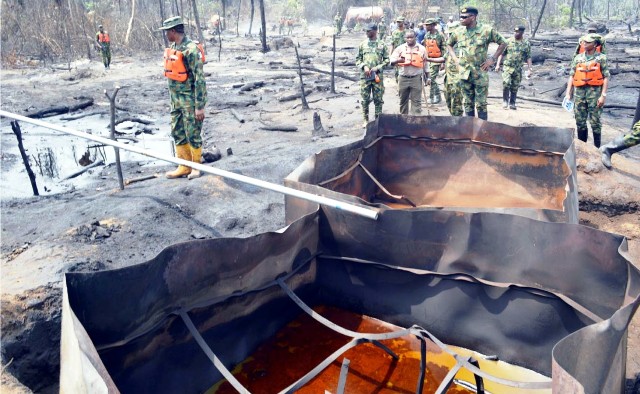Editorial
That FG’s Revelation On Illegal Refineries

While the Rivers State Governor, Chief Nyesom Wike, declares war on operators of illegal refineries whose activities have originated soot in some parts of the state, the Federal Government has complimented his bravery and hardiness in frontally tackling the flagellum and exhorted other governors in the South-South region to emulate him.
Speaking on Arise TV, Special Assistant to President Muhammadu Buhari on Niger Delta Affairs, Senator Ita Enang, urged all governors in the region to take similar steps to extinguish soot emissions from atmospheric pollution. He said governors from the affected states should rise to the occasion and deal with the situation as it was not within the purview of the Federal Government to do so.
Ostensibly shifting the responsibility for the control of the soot ravaging parts of the Niger Delta region from the federal to state governments, Enang, who was also a former Senior Special Assistant to Buhari on National Assembly Matters, said that since the states controlled lands in their localities, they should deal with the problem.
Giving kudos to the Rivers State governor on the way he had managed the soot threat in the state so far, the Distinguished Senator, however, speedily added that what was occurring was fundamentally ‘re-pollution’ as the illegal refiners would simply relocate to distant areas to carry out their nefarious activities. Hear him,
“I will commend the Rivers State Governor Nyesom Wike on the way he has handled the soot crisis in the state so far. But what he has done is what I will call re-pollution of the environment because the so-called illegal refineries will simply move to other locations and the problem will continue.
“Those who are into these illegal refineries are not just mere illiterates or uneducated artisans you find on the streets. Many of them are highly educated. These are people who are well-trained in petroleum refining engineering and technology. They are well-educated in petroleum technology and pipeline technology, so they would always put their knowledge to use.
“Yes, Wike has taken a decision and other governors must take decisions on these illegal refineries. The problem is in Delta State, it is in Akwa Ibom State, it is in Bayelsa State. And the governors of these states are the ones who must tackle the problem and not the President Muhammadu Buhari-led administration because the governors are in charge of lands in their states.”
The Federal Government’s recognition of Governor Wike’s continued efforts to halt the soot devastating Rivers’ residents for more than five years is laudable. However, it is stunning to see that the same federal authorities have shied away from the problem arising from a significant federal resource on the Exclusive List.
The question is, when did state governments become exclusively responsible for going after crude oil thieves and illegal refiners who ordinarily are offenders of federal law? If state governors have to end illegal refining of crude oil in their domains as expected, it is only logical to conclude that they should be in charge of the mineral resources therein. This highlights the country’s institutional inadequacy and weakness.
Enang’s revelation of the identities of the criminals, whom he referred to as graduates of petroleum refining engineering and technology from the famous Petroleum Training Institute (PTI) is indeed shocking and insensitive. It simply means that all the time, the Federal Government knows the felons but deliberately chose to look the other way. No wonder they kept ignoring calls by the Rivers State Government to be involved in the fight against crude burglars.
Oil theft in Nigeria is aided by a variety of factors. Weak infrastructure, such as old pipelines, without a doubt, enables thieves to access crude oil. In addition, general under-investment in the sector and poor safety of the country’s waterways trammel efforts to combat the crime. These obligations, of course, are a matter for the Federal Government, not the state.
By not acting at the time that mattered most, the Buhari’s government only demonstrated a dominant culture of poor governance in the downstream oil sector of the country. Amid high unemployment at 33.3 per cent, poverty, and insecurity, it is scandalous that there are no all-out measures to protect the country’s major export and revenue resource (crude oil) or punish crime and adopt reforms to maximise benefits from the item.
There is a huge niche market propelling the activities of illegal refinery operators, suggesting that both the state and the federal authorities must engage them to avoid unnecessary pollution of the environment and economic loss.
Also, the report of the National Summit on the Integration of Artisanal/Modular Refinery Operations into the In-Country Oil Refining Programme of the Oil and Gas Sector has to be implemented. These were part of the resolutions reached at the end of the emergency stakeholders’ meeting convened by the Presidency in Abuja to address the soot and other environmental pollution caused by artisanal refining activities in Rivers State and other Niger Delta states.
Editorial
AFCON ’25: Bravo, Super Eagles, But…

Editorial
Fubara: Celebrating A Leader At 51

Editorial
Beyond Accessing Bonny By Road

-

 Politics12 hours ago
Politics12 hours agoPFN Rejects Call For INEC Chairman’s Removal Over Genocide Comments
-

 Sports12 hours ago
Sports12 hours agoEnekwechi wins Orlen Cup in season opener
-

 Business13 hours ago
Business13 hours agoNCDMB, Jake Riley Empower 250 Youths On Vocational Skills
-

 Rivers12 hours ago
Rivers12 hours agoFasthire, PHCCIMA, CIPM Host CareerFest 2026 In PH
-

 Oil & Energy13 hours ago
Oil & Energy13 hours agoElectricity Boost: Abia Launches Waste-To-Energy Project
-

 Oil & Energy14 hours ago
Oil & Energy14 hours agoNNPCL Unveils Gas Master Plan 2026 …….Targets 10bcf/day production
-

 Sports12 hours ago
Sports12 hours agoFalconets, Senegalese Lionesses arrive Ibadan for qualifier
-

 Sports12 hours ago
Sports12 hours agoSimba open Nwabali talks

